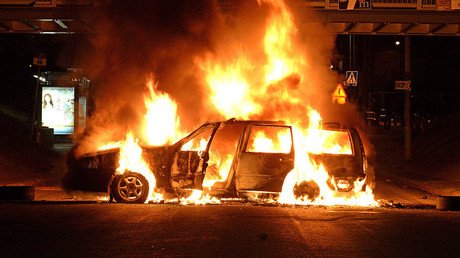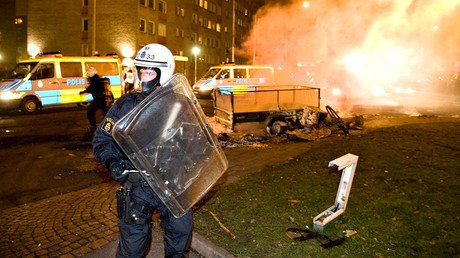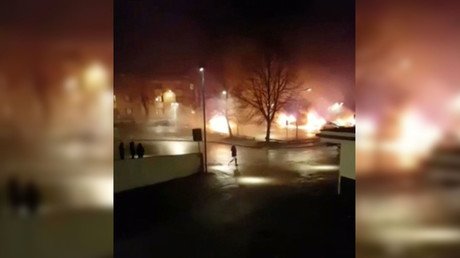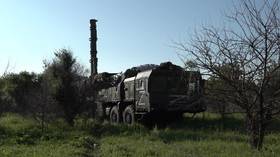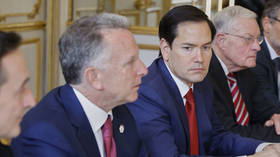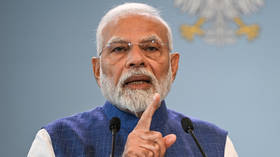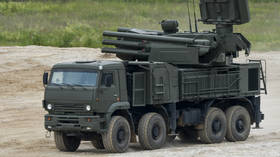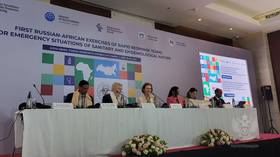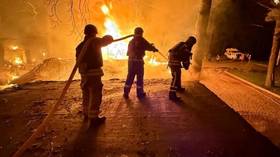‘Youth gangs openly sell drugs, carry guns in Swedish no-go zones’ – local shopkeeper to RT
Swedish police have recently expanded their list of so-called “vulnerable areas,” where crime and extremism run rampant. RT talked to locals and observers about the problems in these troubled areas, widely known as “no-go zones.”
Sixty-one neighborhoods throughout the country were identified in the latest Swedish police report as vulnerable areas, with 23 being categorized as particularly vulnerable, up from 15 last year. These hotspots are “characterized by a low socio-economic status where criminals have an impact on the local community,” according to the police definition.
An estimated 5,000 criminals are operating in these areas, making up around 200 criminal networks in total, according to the report. Witnesses are sometimes afraid to talk to police, and the presence of criminal gangs and the high levels of poverty and marginalization makes it harder for officers to do their job.
“If you run a company in this area, insurance companies do not want to insure you,” Salam Kurda, a local Kurdish shopkeeper and chairman of the corporate association in Husby, Stockholm, told RT. “One of the basic requirements for being a successful entrepreneur is safety, but the risk is quite big today.”
“If your life is at risk, money does not help,” he added. “There has been quite a lot of shooting, very brutal mistreatment of our entrepreneurs, a lot of robbery, so the entrepreneurs have decided to change jobs or move to another area.”
“These people have not been taken care of by society. Society needs to keep the youth busy, make it difficult for them to end up in trouble. They are being used by adults. They sell drugs openly. They carry weapons,” Kurda said.
These deprived neighborhoods have largely immigrant or foreign-born populations, with a higher unemployment rate compared to native Swedes. These neighborhoods also serve as a breeding ground for radicalization and Islamist extremism. According to the Swedish Defense University, 70 percent of jihadi fighters that left Sweden to join Islamic State (IS, formerly ISIS/ISIL) terrorists came from these “vulnerable areas.”
“The problem is the cultural difference and that these immigrants that come to Sweden do not want to integrate, or some of them do not want to integrate. We see this especially in many of the European countries where they have taken a lot of immigrants,” Danish TV editor and host Jonas Christensen told RT.
“We don’t see it in, for example, Poland or Hungary. But in Germany, or in the country where I live, in Denmark, we also have no-go zones, in Copenhagen for example; and Sweden also, especially in places where they have taken in a lot of immigrants,” he explained.
“We see these problems also in France and Belgium. And in Sweden, government people, they don’t want to admit that this is actually a problem so they don’t want to mention these no-go zones as no-go zones.”
Successive waves of refugees and migrants have come to Sweden for decades, first escaping war zones in the former Yugoslavia in the 1990s, and now from Iraq, Syria, Afghanistan and Somalia. Fully integrating these arrivals, who often come from conservative Muslim societies, into liberal cosmopolitan Sweden, has proved to be a challenge. In late 2015, Sweden finally tightened up its generous entry policy, cutting welfare payments and insisting that new immigrants present valid ID documents.
The term 'no-go zone' was originally coined by Swedish journalist Per Gudmundson in a 2014 editorial for the newspaper SvD, shortly after the publication of a police report that originally identified 55 vulnerable areas.
“The police does not use the term ‘no go-zones.' It is originally military slang for areas under rebel control. But the question is if there are any clearer description of locations were ‘the public in many cases experience it as if it is the criminals that rule the areas’ and where ‘police have not been able to fulfill their tasks,’” Gudmundson wrote.
Over the past few years there have been numerous notorious incidents connected to these areas, including: a spate of car burnings and gang-related shootings; a car bombing which killed four people, including a 4 year-old girl; a grenade attack which killed an 8 year-old boy; and even a riot that broke out mere days after US President Donald Trump rather preemptively made a speech about what happened “last night in Sweden.”
Although the list of vulnerable areas in Sweden has grown, this allegedly has more to do with the police reclassifying certain areas based on better intelligence rather than an actual deterioration in the neighborhoods themselves. Statistically, Sweden remains one of the world’s most developed, wealthy and low-crime countries.
Nevertheless, police certainly face difficulties maintaining law-and-order in these areas. In 2014, the police station in the Stockholm suburb of Rinkeby, also known as Little Mogadishu, had to be abandoned after it was firebombed.
“We need to make a clear shift in direction, we cannot continue in this direction ten more years,” Dan Eliasson, Swedish National Police Commissioner, said in June. “Society needs to do more, we need to do more.”
